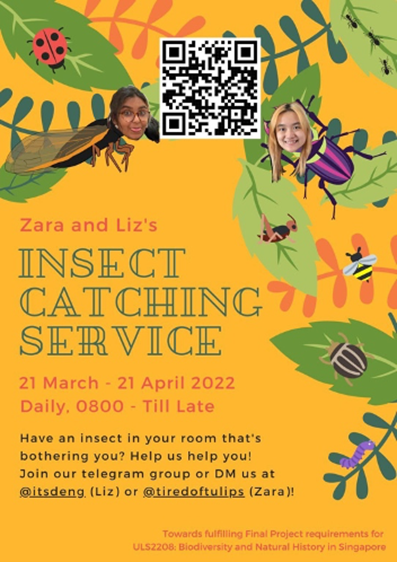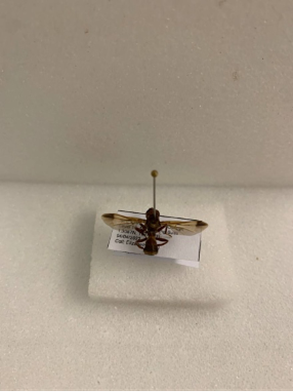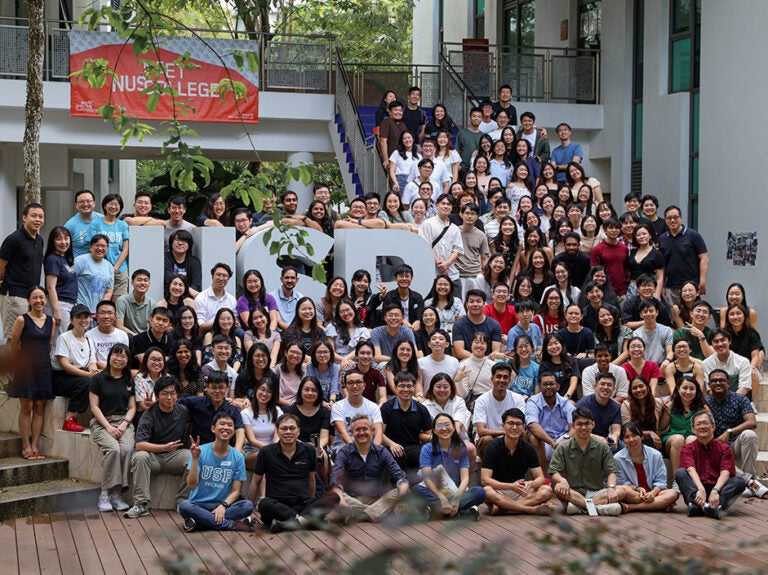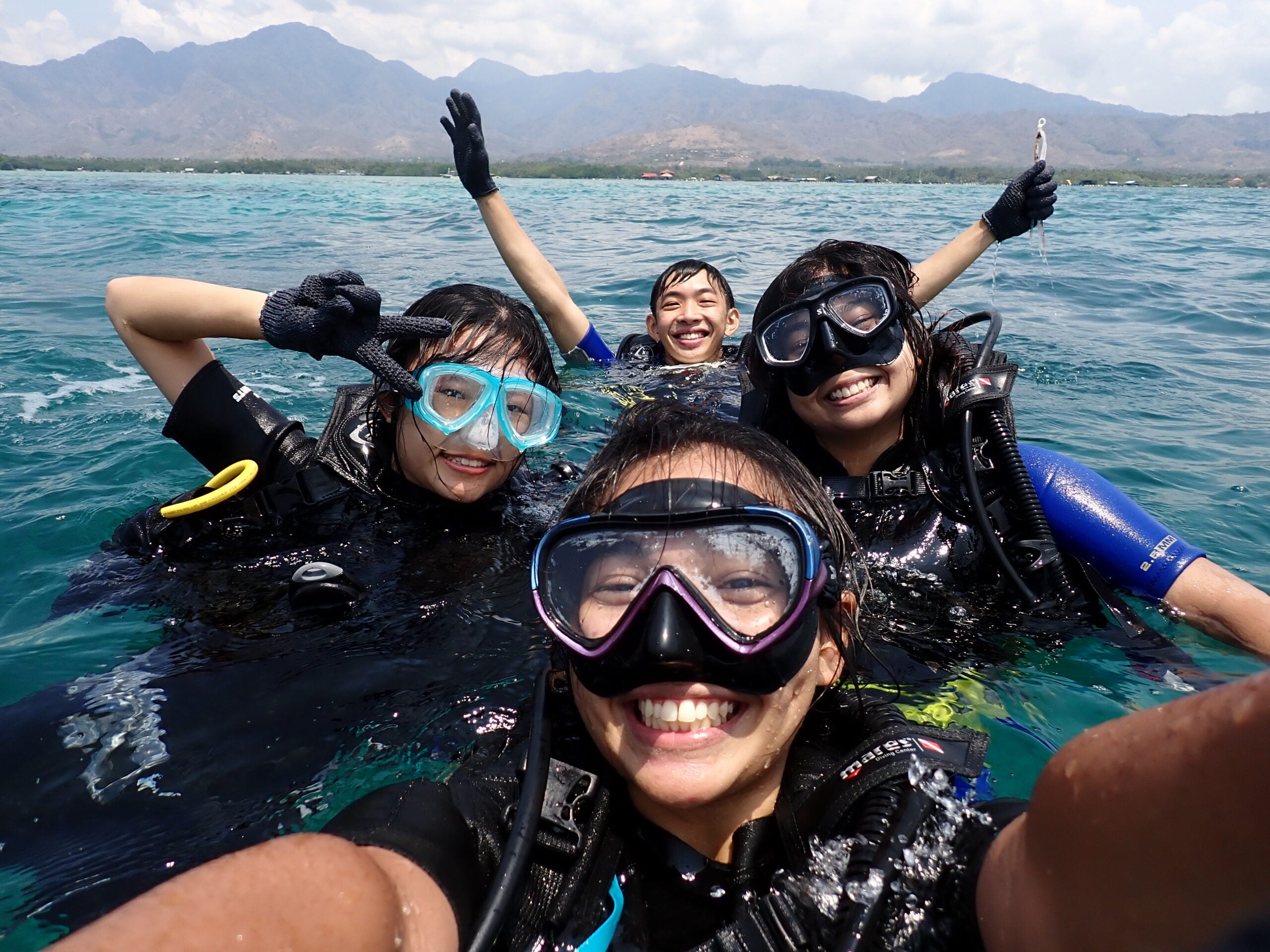In this module feature, we speak to Dr Ang Yuchen, instructor of NST2007 Biodiversity and Natural History in Singapore, as well as fourth year students Zara Karimi and Elizabeth Deng who recently presented their research project at the 7th Conference for Student Research (StuFo 2022).
Click here to watch a little snippet of Zara and Elizabeth’s journey in Berlin!
Often oversubscribed, NST2007 Biodiversity and Natural History in Singapore, seeks to develop students into capable and passionate naturalists, curious about the natural world. Dr Ang who has been teaching this module for five years said, “The natural world is such a wonderful place, and that extends to all the life that exists between the pavements of our concrete jungle. I believe that in everyone is a sense of wonder for the phenomena around us, and one only needs an initial push and exposure to discover that wonder and joy that’s all around us.”
This course under the Science and Technology pillar, starts off with knowledge and theory focused lectures covering a range of topics, including plant biodiversity, museum preservation techniques, ornithology (study of birds), and entomology (study of insects). Outside the classroom, students can also choose to deepen their natural history knowledge by participating in recommended activities including guest lectures, nature painting and sketching as well as nature walks. There are also fieldwork sessions, where students get to practise the naturalist skills learnt in class and experience what it is like to be a field biologist.
Dr Ang, who is an alumnus of the University Scholars Programme, said, “I’m a pretty kinesthetic learner myself, and I’ve always struggled with long technical and theoretical classes. You don’t create a good marble sculpture just by reading about chisels and theorising techniques – you’d have to actually practise it! In the same way, the only way to become a naturalist is to actually explore nature!”
“People would not stop talking about this module, so I told myself, ‘Okay, I got to take this module before I graduate’!” Zara shared. “He (Dr Ang) really tries to keep things engaging in class – you are not just sitting in a lecture, but you get to internalise the knowledge via a hands-on approach,” said Elizabeth.
At the end of the course, Zara and Elizabeth had to consolidate their learning with their very own curated natural history research project. Zara and Elizabeth, who are Sociology as well as Linguistics and Communications majors, respectively, scoped their research to entomology. Zara recalled looking at ants in her room when a thought sparked in her, “What if we launched an insect catching service in Cinnamon College, and catalogued what we found?”
And that’s when it all began.

“Reactions to insects in urban spaces are mostly fear, lots of trepidation as well. But over the course of the module, we realised that insects are generally harmless. So, we wanted to let people know that, hey, you can co-exist with them, there’s no need to be afraid or kill them.” Elizabeth said.
Over the span of two months, both of them caught a total of 156 insect specimen, and preserved 91 of them by freezing them and then pinning them.

Some of the insects in their collection were also of rare species, they shared excitedly. One of them is the Scarab Hunter Wasp – they found out from Dr Ang that it is the second ever specimen caught in Singapore, and the first dated back to 1991.
The two close friends curated a field guide, Insects of Cinnamon College, consisting of insects caught in the residential college, with the help of the community, who sent them messages via Telegram.
The guide aims to inform and equip College residents – and hopefully the community beyond – with know-how to co-exist with the insects that can be found in Cinnamon College, as the pair felt like there was a need to challenge the way residents treated insects in Cinnamon, which exist as an important part of the larger ecosystem.

The duo submitted their project to the Berlin Student Alliance which was selected for presentation at the 7th Conference on Student Research (StuFo 2022). After weeks of preparation, along with expert guidance from Dr Ang, they travelled to Berlin last October to share their findings with other young researchers.
“We were really nervous, but thankfully our presentation went well. Many people came up to us to tell us that our ideas were interesting, and we received plenty of positive feedback,” Elizabeth shared.
Elizabeth and Zara also got to learn from the myriad of presentations at the conference, spanning across cross-disciplinary themes, such as urbanity, climate change activism, law and the environment, from fellow students around the world. It was an enriching experience for the duo, who got to share their knowledge and about their country’s (or residential college’s) biodiversity.


